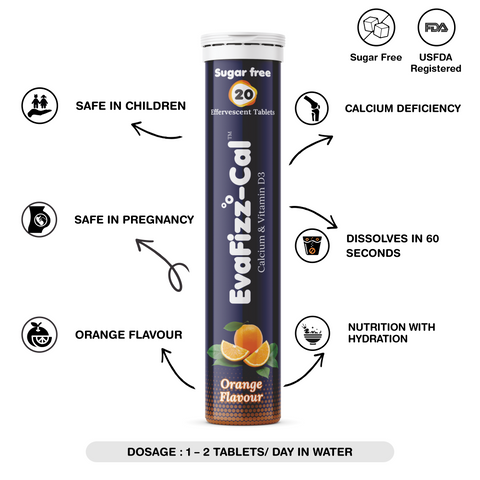Your Healthy Guide to Vitamin D Deficiency

Getting enough amount of Vitamin D is required to keep your body functioning properly. Vitamin D helps you get strong bones and may help prevent some types of cancers. Symptoms of vitamin D deficiency can vary from muscle weakness to pain to fatigue and even depression. To get enough D, include certain foods, supplements, and cautious exposure to sunlight in your daily routine. Vitamin D is one of the most important vitamins our bodies require to stay healthy.
Vitamin D has numerous functions, including:
-
Keeping bones strong
For strong bones, adults need 1,000 milligrams of calcium and 600 international units (IU) of vitamin D daily. Calcium is necessary for the growth and upkeep of strong bones. Adults require between 1,000 and 1,200 milligrams of calcium every day. A diet filled with dairy products is one way to eat adequate amounts of calcium. Calcium supplements are also an alternative for increasing your intake of this vitamin. Vitamin D is necessary for calcium absorption, as well as bone growth, development, and strength.
-
Absorbing Calcium
Vitamin D, as well as calcium, helps in building bones and keeping bones strong and healthy. Weak bones can cause osteoporosis, the loss of bone density, which can lead to fractures. Vitamin D, either taken orally or from sunshine exposure is then transformed into an active form of the vitamin. It is this active form that encourages enough absorption of calcium from your daily intake.
-
Working with parathyroid glands
The parathyroid glands work round the clock to balance the calcium in the blood by collaborating with the kidneys, gut, and skeleton. If calcium intake is inadequate, or vitamin D is low, the parathyroid glands will get calcium from the skeleton in order to keep the blood calcium in the normal range.
What additional aspects can cause Vitamin D deficiency?
-
Age: Your skin's ability to produce Vitamin D decreases as you age.
-
Mobility: People who are housebound or are seldom outside (for instance, people in nursing homes and other facilities) are not able to utilize sun exposure as a source of vitamin D.
-
Skin color: Dark-colored skin makes less Vitamin D than fair-colored skin.
- Human breast milk: A woman's breast milk has a small amount of vitamin D. Often baby formulas also only contain a small amount of D. Hence, babies are at risk of not getting enough Vitamin D.
What are the effects of vitamin D deficiency?
Getting an ample amount of Vitamin D may also protect against the below conditions and possibly help to treat them. These conditions are:
- High blood pressure and heart disease
- Diabetes
- Colon, prostate, and breast cancers
- Multiple sclerosis
- Infections and immune system disorders
What are the various sources of Vitamin D?
You can get vitamin D in a number of ways like:
- Getting exposed to the sun for about 15-20 minutes three days per week.
- Daily diet
- Nutritional supplements
Our recommendation
If you want a quick intake and absorption of Vitamin D, you should try Calor’s EvaFizz Cal- Calcium & Vitamin D3 Effervescent Tablets. These are packed with Calcium and Vitamin D3 that dissolve in 90 seconds. It is safe for consumption in pregnancy and can even be consumed by children.

Can you ever have Vitamin D in excess?
You cannot receive too much Vitamin D from the sun. Vitamin D toxicity is rare but can cause hypercalcemia and along with symptoms like:
- Nausea
- Increased thirst and urination
- Poor appetite
- Constipation
- Weakness
- Confusion
- Ataxia (a neurological disorder that can cause slurring of words and stumbling)
Do not take higher-than-suggested doses of vitamin D without first conferring it with your doctor. However, your doctor may suggest higher doses of vitamin D if he is checking your blood levels and adjusting your dose accordingly.
